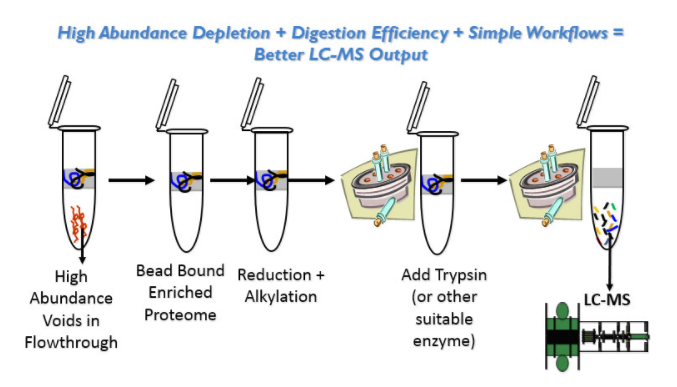
Use On-Bead Digestion to Improve Time Required for Serum Digestion
BSG’s methods development has led to an increased efficiency in protocols used for on-bead digestion of serum proteins, to as fast as two to four hours.
Background
As a leading provider of proteomic, metabolomic and genomic sample preparation and enrichment products and services, Biotech Support Group has been at the forefront to greatly reduce the time required for digestion without the need for additional HPLC columns or sophisticated capital equipment.
As one of the key BSG Advantages,
On-Bead Digestion offers new efficiencies for conventional LC-MS proteomics, as fast as two to four hours as opposed to typical overnight digests. This simple, yet reproducible workflow is equivalent to, or better than, in-solution digestion processes.
We have several references and application reports using this advantage and showing that it performs admirably for proteomic identifications and LC-MS quantitative analysis. We highlight the method’s first citation in "
AlbuVoid™ Coupled to On-Bead Digestion – Tackling the Challenges of Serum Proteomics. J Proteomics Bioinform 8: 225-230."
The Challenge
Serum samples can offer unique challenges in LC-MS proteomic analyses. The two biggest being: 1) the high abundance of Albumin accounting for over 50% of the total protein mass and, 2) proteolytic resistance, in large part due to a substantial amount of glycoprotein present – a particularly protease resistant modification. As a result, the serum proteome contains a continuum range of easy-to to hard-to digest proteins. For targeted quantitative LC-MS analysis, finding the optimal digest condition that can efficiently digest the hard-to digest sub-proteome without over-digesting the easy-to digest sub-proteome remains an industry wide challenge.
The Solution
These error-prone disadvantages are largely removed by method developments surrounding BSG’s AlbuVoid™ depletion product; coupled to on-bead digestion of the enriched bead-bound serum sub-proteome. The destabilized higher order protein structure of bead-bound protein improves Trypsin’s activity with access to the interior regions of the polypeptide chains. With proteins saturating the bead surface, Trypsin remains soluble, maintaining its optimal reactivity. Fast on-bead digestion enables researchers to omit many interim steps and progress straight to reduction and digestion. Thus researchers save time and steps, thereby benefiting from a more robust workflow, and unique proteolytic efficiencies.
The Outcome
Commenting on their on-bead digestion protocol, the researchers note that BSG’s on-bead digestion methodology is indeed faster and more efficient than conventional overnight alternatives for sample preparation. In addition to reducing the digest time and fewer handling steps, the researchers concluded that this on-bead digestion process also improves peptide integrity without increasing over-digestion artifacts.
The article states,
"We conclude that the AlbuVoid™ LC-MS On-Bead product and protocol supports efficient workflows as it greatly reduces the abundance of Albumin peptides, and enriches the low abundance proteome. It provides a suitable alternative or addition to other depletion strategies, and enrichment performance can be optimized for the application and goals of the investigation."
BSG Advantage: On-Bead Digestion
On-Bead Digestion can be applied to all our NuGel™ bead-based enrichment products. Two products are supplied as specialized kits for this purpose and contain the beads, buffers, spin-filters and protocols for on-bead digestion (note – the kit does not contain Trypsin or other proteases).
Notable References that feature the BSG On-Bead Digest Advantage
- Zheng H, Zhao C, Qian M, Roy S, Arpa A, et al. (2015)
AlbuVoid™ Coupled to On-Bead Digestion – Tackling the Challenges of Serum Proteomics. J Proteomics Bioinform 8: 225-230.
- Swapan Roy and Matthew Kuruc. "The Functional Subproteomes of Serpin Protease Inhibitors are Now Open for LC-MS Biomarker Discovery." MOJ Proteomics Bioinform 3.6 (2016): 00106.
- Haiyan Zheng, Caifeng Zhao, Meiqian Qian, Swapan Roy, Amenah Soherwardy, Devjit Roy, Matt Kuruc.
New Proteomic Workflows Combine Albumin Depletion and OnBead Digestion, for Quantitative Cancer Serum. BSG Application Report, Sept 30, 2015.
- Haiyan Zheng, Caifeng Zhao, Swapan Roy, Devjit Roy MD; Amenah Soherwardy, Ravish Amin, Matthew Kuruc.
The Commonality of the Cancer Serum Proteome Phenotype as analyzed by LC-MS/MS, and Its Application to Monitor Dysregulated Wellness. Poster reprint first presented at the AACR Annual Meeting 2016 Conference, April 17-20, 2016, New Orleans LA, USA.
- Swapan Roy, Haiyan Zheng, Caifeng Zhao, Absari Arpa, Matthew Kuruc.
Improved proteomic enrichment and workflow strategies. Presented As A Poster At US HUPO Conference, 04/06/2014-04/09/2014.
- BSG On-Bead Digestion Kits for LC-MS Proteomics, describes AlbuVoid™ and HemoVoid™ applications.
- HemoVoid On-Bead Digest Application Report
|